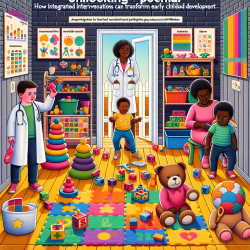Introduction
In the realm of early childhood development, the first 1000 days of a child's life are critical. These days lay the foundation for cognitive, emotional, and social growth. A recent study titled "Adaptation and Integration of Psychosocial Stimulation, Maternal Mental Health and Nutritional Interventions for Pregnant and Lactating Women in Rural Bangladesh" provides valuable insights into how integrated interventions can significantly enhance developmental outcomes in low-resource settings.
Understanding the Study
The research conducted in rural Bangladesh aimed to develop an integrated intervention targeting pregnant and lactating women. This intervention combined psychosocial stimulation, maternal mental health support, and nutritional advice. The study utilized a systematic adaptation process to ensure the intervention was culturally relevant and feasible for the target population.
Key Findings
- Extending early childhood development interventions to include pregnancy and post-childbirth periods is feasible in low-resource settings.
- Incorporating visual cues, interactive role-play activities, and simplified mental health content improved intervention acceptability.
- Motivational meetings with family members and tailoring intervention content to specific age groups enhanced delivery.
Implications for Practitioners
For practitioners in the field of speech-language pathology and early childhood development, these findings underscore the importance of a holistic approach. By integrating multiple facets of health and development, practitioners can create more effective interventions that address the diverse needs of children and their caregivers.
Here are some practical steps practitioners can take:
- Adopt a Holistic Approach: Consider integrating mental health and nutritional support into your existing programs.
- Utilize Visual Aids: Incorporate visual and interactive elements to make sessions more engaging and memorable for participants.
- Engage Family Members: Involve family members in the intervention process to ensure sustained support and participation.
- Tailor Content: Customize intervention content to suit the specific developmental stages of the children and needs of the mothers.
Encouraging Further Research
The study highlights the need for further research to evaluate the long-term impact of such integrated interventions on child development and maternal well-being. Practitioners are encouraged to contribute to this growing body of knowledge by conducting their own research and sharing findings with the community.
To read the original research paper, please follow this link: Adaptation and Integration of Psychosocial Stimulation, Maternal Mental Health and Nutritional Interventions for Pregnant and Lactating Women in Rural Bangladesh.










